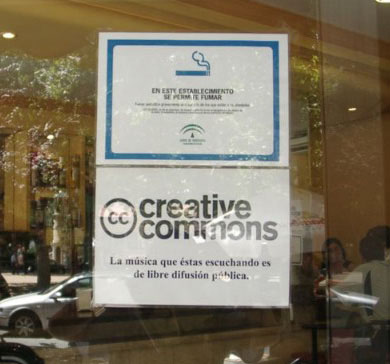Spanish café loses case on "free music"

A Spanish court in Pontevedra has ruled in favour of the Sociedad General de Autores y Editores (SGAE) against a café named Direccion000. SGAE initiated action against the cafe to claim royalties for de public performance of music in the locale, while the owners claimed that they did not have to pay because they were only using “free music” under Creative Commons licences.
The café lost the case in first instance and appealed on the basis that the locale has several signs claiming that they had permission to play free music in the establishment under the terms of CC licences. However, SGAE was able to prove that the music selection included artists under their representation.
Perhaps the most worrying paragraph from the case is that which describes the legal validity of CC licences presented as evidence. According to the court:
“…it is worth to point out that the document presented by the defendants-appellants as a licence for free use of music does not constitute anything other than a mere informative leaflet about its own content, lacking any form of signature, and therefore bereft of legal value whatsoever”.I find this worrying because it seems to imply that CC licences are invalid without a signature, which would spell trouble for their legal validity in Spain. I would hope that the court was shown the human readable deed, and not the licence as such.
I do not have sympathy for the café owners as it seems to me that they were playing commercial music while advertising that the locale only played “musica libre”. Still, I am greatly concerned about wider potential implications with regards to CC contract formation (or licence formation where applicable).

 del.icio.us
del.icio.us




4 comments:
You wrote:
"I do not have sympathy for the café owners as it seems to me that they were playing commercial music while advertising that the locale only played “musica libre”.
However, I don't think that's actually what the collecting society is saying. Instead, when the collecting society says:
"SGAE was able to prove that the music selection included artists under their representation."
what they're saying is that some of music at the Cafe was by artists signed with a collecting society, and thus the fact that it may also be Creative Commons music is not relevant, because the two contracts (collecting society contract, vs creative commons grant) are contradictory, and since the CC grant doesn't have a signature, the collecting society contract prevails.
It's been the collecting society's (except in the USA) position that you can't be a member of a collecting society and also assign your music under a CC license. When musicians do that, the courts then see a conflict between the two, and side with the collecting society because they have a signature from the artist.
What needs to happen is for collecting societies to allow artists to assign CC licenses to their works, until then, my understanding is that the only way a cafe can legally get away with not paying a collecting society is to play only music that is not registered to any collecting society, or only registered with a USA collecting society and is CC licensed.
Hello Magnatune,
SGAE's argument is that the café was playing commercial music AND CC music. They offered proof of this, including visits from witnesses that pointed music from Gloria Estefan, Joaquín Sabina and other SGAE artists.
If this Cafe were playing CC-NC music while conducting commercial transactions, won't this be a violation of the Creative Commons licenses? According to the guidelines that the lawyers at the Creative Commons sent out on commercial exploitation activities it would be. The Cafe is using the CC music to create an atmosphere for their commercial enterprise. Artists who license their music under CC-NC are clearly stating that you can use their music for non-commercial use. If one uses this music in a commercial venture, then the artist should be compensated for this use. Performing rights organizations such as SGAE is the way these artists can get paid for public performances of their music. I see this court decision as win for SGAE and the Creative Commons.
well, that is an interesting incident.. using musics by local music bands is not fair in my point of view. but it the music as free under creative common license then it should be an exception.
Post a Comment